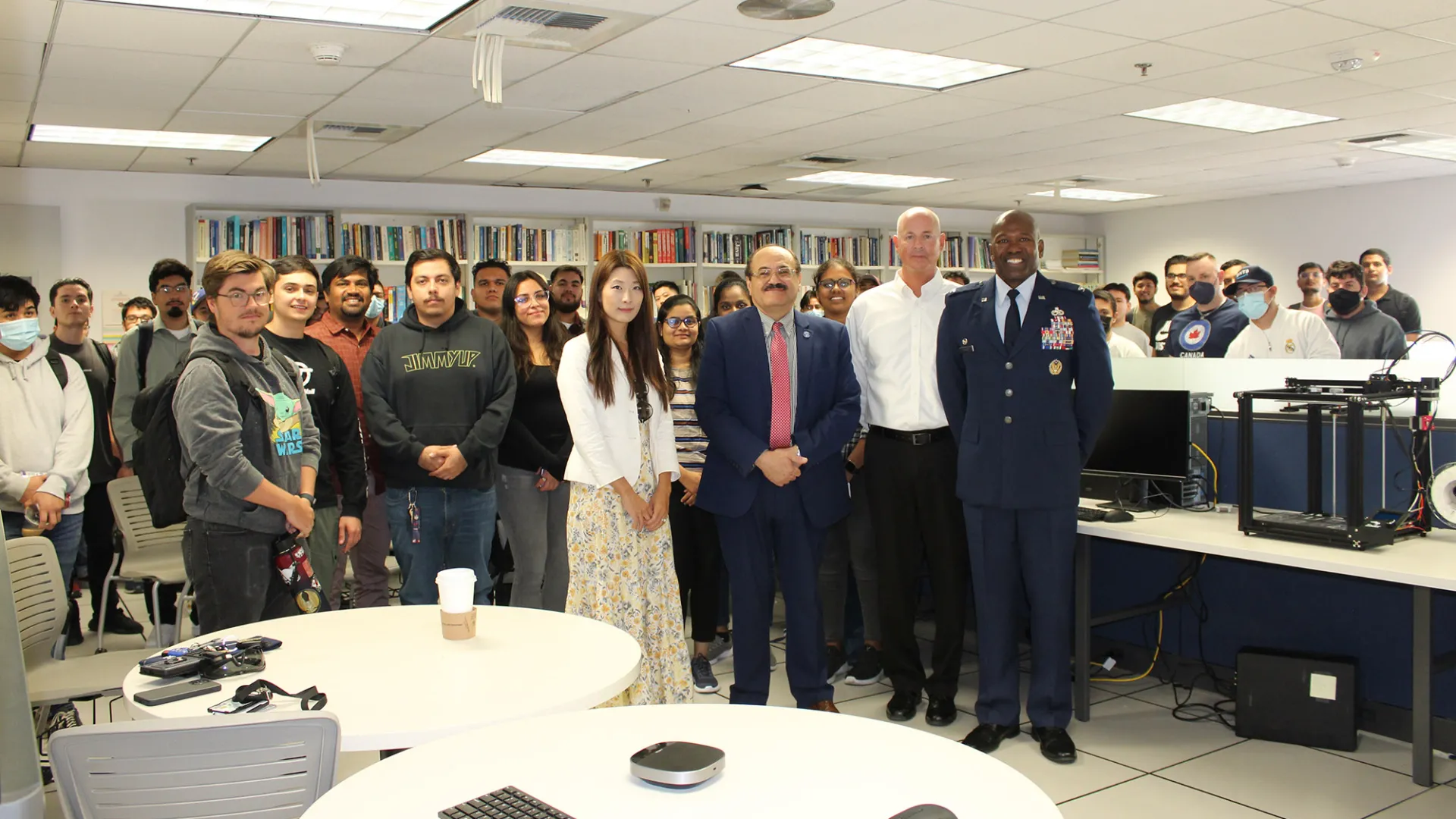Joe Gutierrez | Office of Strategic Communication | (909) 537-3007 | joeg@csusb.edu

Scholarships. Internships and jobs. Research. And all come with the opportunity to play a role in defending the country from “the center of the aerospace testing universe.”
As part of ongoing efforts to support student success, the College of Natural Sciences’ School of Computer Science and Engineering recently launched a series of events designed to provide educational and career opportunities for students pursing a degree in a STEM (science, technology, engineering, and mathematics) field and the chance to network with military and defense industry contacts.
Computer science major Pavani Thumpati attended one such event, a STEM career fair on Oct. 26, to learn more about job prospects and apply for internships. He said computer science is an exciting field because it is his “dream is to work in the most reputed information technology companies with booming technologies.”
The career fair is part of a broader effort by the college to decrease equity gaps among students, retain students in STEM majors, increase graduation rates, provide access to valuable undergraduate research and learning assistant experiences, and prepare graduates for graduate and professional schools. These activities are supported by a five-year U.S. Department of Education grant that is designed to increase the number of Hispanic and low-income students who graduate with STEM degrees.
“Student success is our No. 1 priority,” said Sastry G. Pantula, dean of the college. “By providing these valuable resources and opportunities to our students—particularly those who face socio-economic challenges—we are laying a foundation for academic excellence, professional achievement, and leadership development. Science opens many, many doors in so many fields, including military and government service.”
The school hosted the career fair in partnership with CSUSB’s Air Force ROTC, and a visit to Edwards Air Force Base for ROTC students and STEM majors is tentatively scheduled for March 31.
Thumpati said the career fair “was very useful to me in my educational career goals, like researching about the technology, seeking the knowledge from different resources, managing time for learning, and building a strong network.”
More than 145 students attended the career fair, with participants from the U.S. Air Force 412 Test Wing and the Engineering Directorate from Edwards Air Force Base. The test wing plans, conducts, and analyzes test missions and reports on flight and ground testing of aircraft, weapons systems, software, components, modeling, with a focus on engineering, maintenance and flight operations. The directorate manages several contracts with Northrop Grumman and Lockheed Martin.
The event was attended by Air Force Lt. Col. John O’Meara, chair of CSUSB’s Air Force Reserve Officers’ Training Corps (ROTC) program; Col. Ahave Brown Jr., commander of 412 MXG Squadron at Edwards; and Steve Ewart, the Air Force head of the Engineering Squadron, also at Edwards.
The base conducts and supports research and development of flight, tests and evaluates aerospace systems from concept to combat, and hosts tests conducted by the commercial aerospace industry. It is the home of NASA’s Armstrong Flight Research Center, and touts itself as “the center of the aerospace testing universe” on its website.
The event encouraged students to access and apply to various opportunities, including:
- 412th Test Wing internships and full-time employment opportunities through the U.S. Air Force Civilian Service.
- 10-week summer research internships at a naval laboratory through the Naval Research Enterprise Internship Program.
- The Science, Mathematics, and Research for Transformation (SMART) Scholarship, funded by the U.S. Department of Defense.
- The National Defense Science and Engineering Graduate fellowship program, which is designed for graduate students pursuing doctoral degrees.
“The campus Air Force ROTC partnered with the School of Computer Science and Engineering because many of its students are majoring in STEM fields, such as computer science,” said Khalil Dajani, director of and professor in the school. In addition, some ROTC students are benefitting from the school’s academic offerings because they are double majors in computer science or they are taking its classes as electives or certificate courses, in addition to seeking to network with Air Force summer training and jobs opportunities.
ROTC students must complete a rigorous four-year academic and military training program that is intended to prepare them to enter active duty as highly effective leaders in the Air Force or U.S. Space Force, the space service branch of the armed forces.
“This collaboration between our school and university and our military partners will open up many post-graduation opportunities for students,” Dajani said. “It will also provide them with many previously untapped resources, all in the name of serving our students and defending our nation.”
Many of these military-affiliated opportunities are designed to increase the number of American citizens who are trained in science and engineering disciplines that are relevant to military and national interests.
“Come be a part of something big!” Brown, the Air Force colonel, said to encourage students to participate. “Smart minds, cool jobs, and awesome rewards! Fueled by innovation, talent, and ambition, the Air Force Civilian Service is seeking civilian professionals prepared to deploy capabilities on behalf of the United States Air Force.”
These events are supported by the nearly $5 million “Proactive Approaches for Training Hispanics (PATHS) in STEM” grant. The grant also helped establish the college’s Science Success Center. The center guides students to valuable resources such as counseling and psychological services; provides supplemental instruction, learning assistantships, undergraduate research opportunities; and other programs to improve academic and career success. The center also hosts self-help workshops, career panels, and social events where students can cultivate friendships; and host peer tutoring and small group learning communities. And it works to improve collaboration between CSUSB, community colleges, and employers.
For more information about these programs and opportunities, visit the School of Computer Science and Engineering homepage.